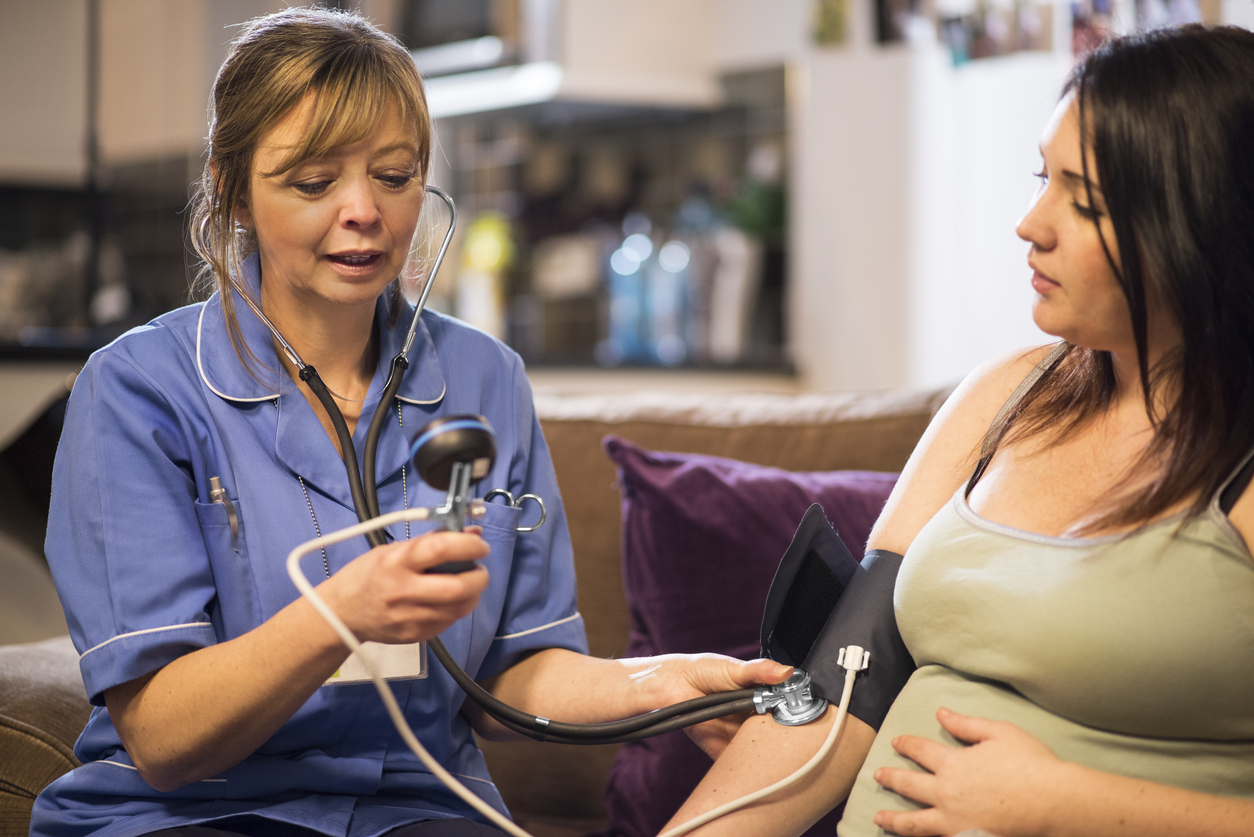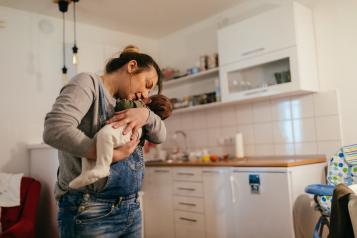Mental health and the journey to parenthood: Sharelle's story

A frightening first birth
“The troubles I had in my second pregnancy stemmed from the birth of my first son.
I was induced, I had an epidural, I was stationary throughout, I ended up having lots of equipment in the room and worried faces, I had a cannula in both hands, and they were talking about putting one in my foot.
I found out I had an infection, and when they gave me penicillin they asked if I was allergic to it. I don’t know if I had a reaction to the penicillin or a panic attack, as I didn’t feel in control at all. They took the penicillin out and I was flushed with water. It was quite a scary few minutes, I genuinely thought I was going to die.
Our baby developed tachycardia and I was then rushed to theatre and he was delivered with forceps.
I only got to hold him for a minute before he was rushed away from me and given antibiotics.
I can tell you all this now, but if you had asked me about my first birth during my second pregnancy, I wouldn’t have been able to tell you without being in pieces.”
Great medical care, limited mental health support
“Afterwards when I was on the ward someone came around with a card and said if I needed to speak to someone within a specific amount of time I could call a number, but I didn’t.
Nobody asked me how I was feeling. I was in hospital for seven days with my son. I saw a lot of midwives and was so well looked after medically.
When I got home, a midwife came round and told me that the birth happened the way it did because the baby was facing the wrong way, but he wasn’t.
Even after all I went through she said if I had been more mobile the baby would have turned. I felt she was blaming me.
During my first baby’s first week, he had a terrible infection and had to have a lumbar puncture at three days old. I didn’t announce his birth for seven days as I wasn’t sure he was going to make it.
Up until the age of one I loved him, I wanted to keep him safe - you act on instinct, do whatever you can to get by - but something happened when he was one and I had a massive surge of love for this child. It felt like we had finally bonded.”
Anxiety during a surprise second pregnancy
“My second pregnancy wasn’t intentional, and we had a big discussion about what we should do. It took me until I was 17 weeks to start thinking seriously that I was going to have this baby, which was very hard because you’ve told people by this point and started talking about when the baby will be here, so to have that late realisation was very difficult.
I started having real problems with anxiety from the moment I found out. I found out when I was four weeks pregnant, and by 12 weeks I was having panic attacks and really feeling unwell. I felt like this was going to be me now, I was anxious, I couldn’t go anywhere, I didn’t want to risk doing anything.
I felt like I spent eight months of my life thinking I was going to die. I was quite emotional because of the risk to my three-year-old.
I was quite obsessed with death and avoiding death at all costs, because what would my little boy do? I became quite mollycoddling of him and wouldn’t really let him do things.”
Lack of support for tokophobia
“I’d developed a fear of being pregnant and giving birth (tokophobia) and there was no service geared towards helping with that.
I was so terrified that I wouldn’t have had another child if it wasn’t for my husband’s support.
I told my GP that I was thinking about not having my second baby and he told me to contact family planning and they told me to contact Mary Stokes for advice. I didn’t want to speak to an abortion clinic, I wanted someone to help me get passed this feeling.
Nobody signposted me towards mental health services, I had to find them myself.”
Treatment that made the difference
“I was put on Diazepam. Because of the reaction I had to penicillin during my first birth, I still have a bit of anxiety about medication. I had taken Diazepam before, so I knew it was safe, but I only took half my dosage. I took 1mg before bed so I could sleep because otherwise that’s when I started having panic attacks.
I found CBT helpful, it had rules I could follow, it had a structure I understood, exercises I could do, and every time I did them I felt like I was doing something to help myself.
I also did hypnobirthing. I was scared about giving birth and that prepared me to be less scared and to advocate for myself, it really helped my confidence.
It was EFT (Emotional Freedom Techniques) that made the difference and that helped me move passed my first birth. EFT is like acupuncture but without needles. Whilst touching pressure points you talk about your trauma.”

The difference great people made
“My midwife during my second pregnancy was amazing. I couldn’t have done it without her.
She discussed the benefits of hypnobirthing, but it is quite expensive so we were lucky to be able to do it. She didn’t make me feel like we had limited time, she was available when I called her. When you have anxiety and depression you can be overly worried about everything, including contacting your midwife, but she made it feel like I wasn’t bothering her. My GP who works with women and babies was also excellent.”
A much better second birth experience
“We had a very natural unmedicated birth with my second son, I truly believe due to the hypnobirthing. If I could do any part of that nine months again, I would do the birth.
I bonded with him much more quickly. Even though the pregnancy was horrible, and I was worried that I would get PND before I had him, when he arrived I felt this huge relief that we’d made it.”
Have you been affected by this story?
If the content of this story causes you to think of anything that has happened to you or someone you know and you feel upset, worried or uncomfortable, please see the Maternal Mental Health Alliance's support page for a list of services who may be able to help.


